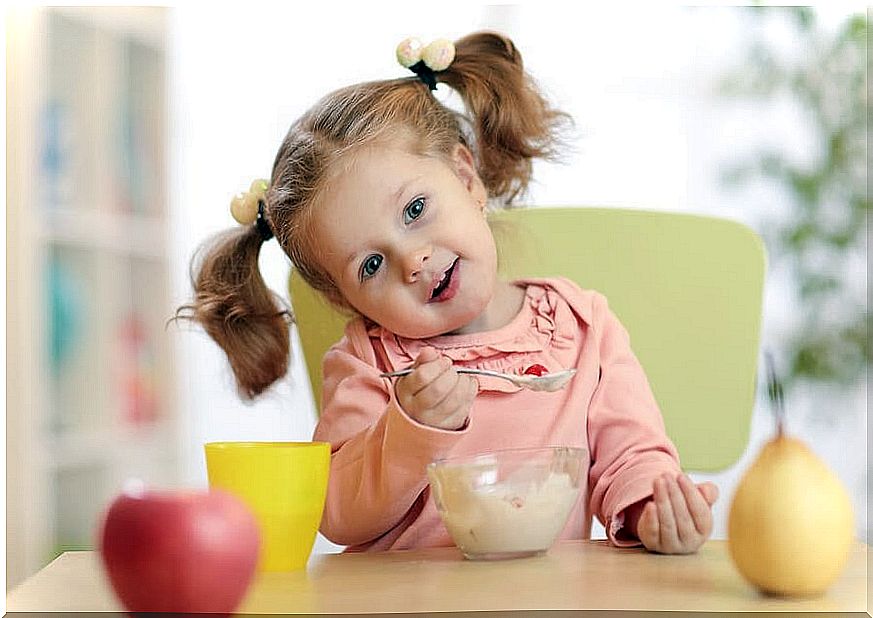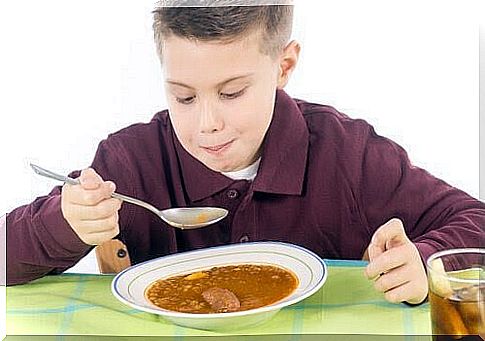Food That Improves Your Child’s Immune System

There are certain foods that can help naturally improve your baby’s immune system. They also protect them from viruses that can be spread in preschool and school and allow them to grow up healthy and strong.
Malnutrition in proteins, carbohydrates and healthy fats – which can be found in olive oil, fruits and vegetables rich in vitamins A, C, E and D – causes children to have a weak immune system and not be able to fight diseases and infections.
With this in mind, we have compiled an overall list of foods to improve your child’s immune system. We have also included some very effective and simple recipes.
A balanced diet is important for your child’s immune system
Eating a balanced and healthy diet ensures that children have an optimal state of health. Their immune system will effectively fight diseases, especially common viruses that circulate in schools and other groups of children.
When talking about a balanced diet, dietitians say that it is imperative to eat from all groups in the diet circle. Of course, there will be exceptions for children who have special diseases, food allergies or intolerances.
A common question, however, is: What happens to children’s immune systems when they do not get enough nutrients in their diet?
Lack of protein
When children do not eat enough protein – found in meat, chicken, fish and beans – they show a decrease in the formation of lymphocytes. These are responsible for the optimal functioning of the immune system.
Lack of carbohydrates
Carbohydrates are found in products such as rice, pasta, flour, cereals and potatoes. These foods are responsible for providing energy, so they are necessary for the body’s immune system.

Lack of fat
When dietitians and nutritionists recommend that children eat fat, they always clarify what type of fat they should eat. While the lack of certain foods can damage children’s immune systems, even a poor quality product can also make them vulnerable.
This is what happens to fats. If children eat saturated fats that come from pastries, sausages or trans fats, it will cause an almost immediate and significant reduction in their immune system.
The only fats recommended for children are those that contain polyunsaturated fatty acids, such as omega-3 fatty acids. This is found in olive oil and in fatty fruits such as avocados.
Lack of vitamins from fruits and vegetables
Of all the groups in the diet circle, the one that provides the most vitamins and minerals is fruits and vegetables. When a child does not eat from this group in sufficient quantity, his or her health is affected in all aspects, and the cells of the immune system are oxidized.
Foods that enhance your child’s immune system
The foods that contribute most to the baby’s immune system are those that contain vitamins A, E, C and D, as well as iron and zinc. Some of the most advantageous are:
- Carrots
- Broccoli
- Kale
- Pumpkin
- Avocado
- Orange
- Apple
- Lemon
- Kiwi
- Papaya
- Grapefruit
- Oats
- Salad
- Honey
- Nuts
- Egg
- Vegetables
- Salmon
- Tuna
- Shrimp

Recipes to improve your child’s immune system
Ensuring that our children eat enough fruits and vegetables can be a real challenge for many parents. However, we can prepare juices and smoothies that contain several beneficial ingredients for their health, and take the help of our children’s favorite flavors.
The most potent juices to boost a child’s immune system
- Strawberries, orange and guava
- Apricot, orange and grapes
- Currants, spinach and oranges
- Currants, lemon and apple
- Pumpkin and carrot
- Orange and carrot
- Cold or hot lemon juice with honey and water
- Apple, ginger and parsley
- Apple, lettuce and sesame seeds
- Pineapple and almonds
- Strawberries and mango
Serve the juices freshly squeezed and, if necessary, dilute them with a little water, or add a little juice from cucumber or watermelon to get the right consistency. As a final recommendation, remember that children should consume at least two servings of fruits and vegetables a day, especially citrus fruits such as oranges, lemons and tangerines, which are rich in vitamin C.
It is also important to eat nuts, yogurt, honey, cereals, meat and legumes at least twice a week.









